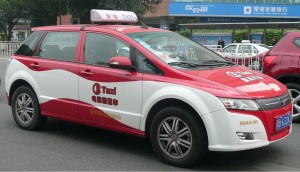
Beijing officials are attempting to convert the city's fleet of 46,000 taxis to EVs, like this BYD e6 cab.
Facing public pressure to reduce some of world’s nastiest urban air pollution, the municipal government in Beijing is moving to turn Chinese capitols taxi fleet green.
The objective is to convert Beijing’s 46,000 taxis into electric vehicles over the next three to four years, according to Zhang Xiyong, vice president of China’s Beijing Automotive Industry Group.
During a discussion at the Global Automotive Form in Wuhan, Zhang said public pressure through social media prompted Beijing’s municipal government to order the overhaul of the city’s taxi fleet.
Beijing anti-pollution drive also calls for setting aside more than 10% of the city’s parking spaces for electric vehicles. In addition, Sinopec, China’s state run oil company also has agreed to set up EV chargers at its sprawling gas stations and the manager of state electric grid will work to make it easier to recharge vehicles in the middle of the night when the demand for electricity drops.
The plans also calls for setting up four special stations around the city so drivers can swap depleted batteries for ones carrying a full charge, Zhang said. The idea is very similar to the idea pioneered by Better Place, which proposed a system for exchanging the batteries of electric vehicles to make them more appealing to consumers concerned about vehicle range.
(Three Chinese makers expected to be global players. For more, Click Here.)
In temperate weather, electric vehicles can usually travel about 100 miles on a single charge today, which is usually enough for a regular commute. However, the range tends to limit their appeal for many motorists.
(Click Here for details Chrysler’s latest recalls.)
The sweeping change to Beijing’s taxi fleet creates an opportunity for China’s domestic automakers to develop vehicles that use new sources of energy. Innovation is critical to the future of China’s domestic auto industry, which has clearly not invested enough in research and development in the past.
(To see why Tesla may use franchised dealers, Click Here.)
Beijing already has some very tough restrictions on vehicle and it has deliberately reduced the number of new vehicles sold to residents of China’s capital by reducing significantly the number of licenses it approves for new vehicles.
China’s fight against pollution, which has proceeded by fits and starts. But the heavy smog that covers China’s sprawling cities also has made it a huge potential market for battery electric vehicles.
